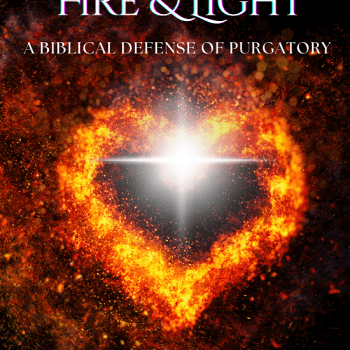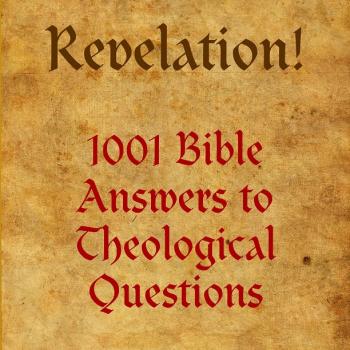
This occurred on a public Facebook page of a Facebook friend of mine. The words of my opponent will be in blue.
*****
The inherent problem of apologetics [is that] it has no room for real conversation to exist on theology. Apologetics is the conclusion being presented as proof of the hypothesis, and the conversation ends there. Theology allows for criticism, highlights and disagreements. It allows for not two paths but a multitude of paths for discussion.
The root cause is apologetics. You got people on two sides hellbent [on] arguing [about] something and then turning arguments into personal attacks of characters. As long [as] people are only willing to engage the conversation [on an] apologetics [level] this will continue to happen.
If we have nothing that we accept as true, full stop, that we then go out and defend, how do we apply Jude 3 (“contend earnestly for the faith”) and 1 Peter 3:15 (“stand ready to make a defense”)? There is this thing in the Bible called “the faith” and Jesus and Paul casually assume that there is one “truth” and “tradition” and “message” etc. etc. that exists “out there” to be adhered to and defended, which is so clear that we are to separate from those who continually violate it.
*
You act as if Christians don’t have an existing belief-system and must always be uncertain (this is an outlook that I have called “the quest for uncertainty”).
Thus, the problem isn’t apologetics, which is a biblical command, but rather, those who do it poorly (without love and/or knowledge; confusing it with a stupid quarrel or an arrogant chest-puffing exercise). You throw the baby out with the bath water. It isn’t like people don’t vehemently disagree on theology, too, and often with rancor (see Protestantism and Orthodoxy), so it’s a false dichotomy, too.
*
You say that with apologetics “the conversation ends.” It never has to. As an apologist, myself, I always want to have conversation and discussion (because that is how truth is often arrived at), and I do it without bitterness and personal attacks. The problem is that when there is any disagreement, folks only rarely want to continue on with a normal conversation. It takes two. The reluctance to converse is almost never on my end. The only time I refuse to engage is when it is absolutely clear that a person doesn’t have the spirit of dialogue and open-mindedness that goes with it. It becomes evident very quickly, if this is absent (especially in proportion to how experienced one is at dialogue and debate).
*
Truth is not dying on the often exaggerated and reinterpreted narratives that apologetics uses to consequentially present historical and theological points in a system of confession that reflects presupposed beliefs rather than presenting the historical and theological points in contextual presentation and allowing them to drive the hermeneutics. Apologetics is, in the end, the argument of a person who believes [he] is right and who will not budge otherwise. It is the end of conversation and the end of the study of truth. Apologetics is, for a reason, the lower tier of philosophy, theology, and history, often being neither good at presenting truth nor at the study of the things it claims to defend. Disagreeing with theology is a real thing, and should be the issue it is when people turn it into a dichotomy dissection in which splits the idea that one side is fully right and clean and the other is wrong and filthy in their error.
*
So you don’t have a set group of Christian beliefs? Or are you an atheist or simply non-religious? If you have a set of Christian beliefs, then according to the Bible you are obliged to defend it and share it with others, in evangelism. And that is your problem. You can’t “diss” apologetics” within a Christian and biblical paradigm.
*
So it comes down to what you believe. As it is, you sound almost relativistic or only nominally Christian. I don’t know unless you tell me what you believe.
But you are just as vehement in an “anti-apologetics” view as you say we apologists are in our view. You make blanket statements and you seem quite sure of your views, which is scarcely indistinguishable from what you critique.
*
So in my humble opinion you have insufficiently thought through your own presuppositions. Jesus and Paul and the Church fathers and doctors of the Church all passionately engaged in apologetics, so, again, if you are a Christian, you can’t possibly be dead-set against it, as you are.
You also wrongly assume that apologists never change their minds. I was an apologist as a Protestant and massively changed my mind when I became a Catholic. If I am ever persuaded that Orthodoxy is the way to go, I will surely follow that path too. I’ve also changed my mind on big issues as a Catholic (e.g., capital punishment), just as I did on many issues as a Protestant apologist. So the key is to always be willing to follow truth wherever it leads. But in any event, there is such a thing as truth. We’re not here to endlessly speculate and never arrive at it.
*
Lastly, it’s not true that one has to demonize all opponents in dialogue. I don’t do that at all. I take the greatest pains not to do so and note that errors usually come from false premises obtained along the way and not from an evil will or bad faith. Accordingly, I’ve written about how individual atheists could very well be saved, per Romans 2.
*
You’re the one in effect demonizing a whole field (apologetics) by dismissing it as a “bad” thing. In doing so, you go after Jesus and Paul, etc., and that’s your problem if you are any sort of Christian. Once you tell me what you believe, it’ll become clearer why you feel led to go down this path.
*
[he then put up a “laughing” icon in “response]
*
See, this is why I can’t take y’all seriously. The jumping to non-fundamental conclusionism . . .
*
It’s why you don’t offer a serious critique, unless you further explain yourself and offer any sort of counter-argument to what I have said. We still have no idea what your belief-system is. Instead, you go right to immediately judging and dismissing (and now essentially laughing at; you put a laughing icon in “reply” to one of my posts) an entire group of human beings: Christians who rationally defend what they believe.
*
So far, you have shown zero interest in dialogue, and this is the high irony. You would rather preach and proselytize with your seemingly skeptical outlook. You condemn an alleged widespread attitude among apologists of being dogmatic and unwilling to dialogue. Far too many persons are that way; I agree, but not the whole group as a general description. At the same time, you exhibit precisely the same closed-minded spirit that you have just condemned.
*
I just got through writing that it’s usually the other guy unwilling to dialogue, and then you prove the validity of the generalization (based on long personal experience: 44 years, in fact) before our very eyes.
*
[he again put up a laughing icon in “reply’]
*
If you are serious about the issue, it is with apologetics, not apologists. Apologetics, as a normative practice, often creates a narrative of circular argument that relies on authority and, more often than not, an interpretation of it. Apologetics requires rejecting real evidence that shows changes in doctrines and dogmas, and employing any method to argue for an interpretation that avoids admitting any obvious bias. I find it a lower form of theology, history, philosophy, linguistics, and related disciplines.
*
I adhere to a quasi-apokatastasis system, since I believe everything that exists in creation exists within God and can never exist outside of God. A Christological cosmic narrative differs significantly from concepts of God and the universe as fully separate, with only the acts of God existing in God, not the essence, or just the manifestation of God’s existence operating in the universe. My dislike of the “I am right and you’re wrong” position of apologetics stems not from that, but from the clear textual evidence and archaeological findings regarding changes, reinterpretations, and frameworks. Religion is primarily an aspect of anthropomorphic human institutionalism, subject to change and adaptation like any other institution. I refuse to simply sit down and say otherwise or perform mental gymnastics to be “right” while others are “wrong” and therefore need to convert to be right. The sole sacrament of Christianity is a mystery that every Christian, and even many non-Christians, both have and attain, guiding the movement from the finite to the infinite. I do not need to tell everyone who is right to win arguments or prove my side true. I am always willing to exchange views with people, not to show who is right, but why we believe differently. If I wanted circular reasoning and wasting time, Islam is there to join or argue against never truly making a difference on reality.
*
I became a Catholic due to reading St. Cdl. Newman’s
Essay on the Development of Christian Doctrine, and development is my
favorite theological topic. But it depends on what we mean by “development.” Newman is very precise as to his own meaning: it is development without losing the kernel or essence of a doctrine from beginning to end (an acorn and an oak tree are the same thing, on a continuum). All Christians who accept biblical inspiration also believe in progressive revelation. Doctrines have indeed changed. But we
do deny that what we believe to be the true doctrines have changed in
essence.
*
You criticize us for feeling certain about Catholic dogmas, while you sit there and by all appearances and perceptions feel absolutely (?) certain that your worldview that you are now describing (thank you!) is correct and ours — at least what you perceive to be ours — is wrong.
*
So you absolutely condemn absolute (as opposed to relative) views, and propose an absolute view as a replacement: all the while severely chastising any sort of dogma or certainty. This huge self-contradiction is discussed a lot by C. S. Lewis in his books and articles (e.g.,
“The Poison of Subjectivism”). You seem quite blissfully unaware of it, and that’s how it usually goes with folks who hold these sorts of views.
*
As to one of your many specific criticisms: I, as a professional apologist, do
not rely on — and have
never relied on — “circular argumentation” at all: nor does any apologist who is even remotely deserving of that title. So, for example, in my last officially published book from Catholic Answers,
The Word Set in Stone: How Archaeology, Science, and History Back Up the Bible, you can see in the title alone, what my methodology is. I am taking things (secular fields of knowledge) outside of the Bible to offer evidence that it is historically trustworthy to a remarkable degree. I make it clear that I am not claiming that this proves biblical inspiration, but that it does offer a view that is *consistent* with that position.
In other words, if the Bible is indeed an inspired revelation, we would expect at a
minimum for it to not contain obvious massive errors of fact and self-contradictions, because those things would be counter-evidences of inspiration and guidance from an omniscient God. And that is the purpose of another book of mine (I offer it for free, too):
Inspired!: 198 Supposed Biblical Contradictions Resolved. This is literally an answer to actual atheist arguments to the effect that the Bible is ridiculously and relentlessly self-contradictory and nonsensical and anti-scientific. So I give them the respect of seriously considering their arguments, and offering a reply from one who thinks that they are all bum raps. Then my readers can make up their own minds. I give them the atheist argument and also the Christian reply, and may the best argument prevail!
That’s not circular, either. It’s applying knowledge of biblical literature and of logic and science and making an argument. Moreover, the Bible is very often critiqued by those who, ironically, usually know very little about either biblical literature (genres) or exegesis. I’ve found that this is almost invariably the case. Many of these atheists with whom I have dialogued were former fundamentalists and they continue to interpret in that same manner, as if the Bible is always to be interpreted with a wooden literalism.
*
I never was a fundamentalist. I was a nominal Methodist and then a practical atheist with a fascination for the occult. When I was ready to be a Christian at age 18 I applied reason to it, and all the more four years later when I started doing apologetics in a serious way. But none of what I do is circular reasoning. There are some apologists who at least partially fall into that (it’s my critique of a school called presuppositionalists, who tend to be Calvinists), but my basic category is evidentialist apologetics, which is a very different approach.
So now we may perhaps be starting to engage in an actual dialogue. One key to determining that is whether you put a laughing icon underneath my comment for the third straight time. If you do, I’m done with this exchange. If not, then it’s up to you to figure out if I’m sufficiently “serious” for you to spend time engaging in dialogue with. You’re the one who came onto this thread broad-brushing against apologetics and apologists. As one of those, myself, one might expect that I would respond. No one appreciates being massively misrepresented.
*
One can’t enter into true dialogue if he or she has utter disdain for the other person’s views or if (as I think is more the case with you) one exhibits a poor understanding in several ways of the view (or caricature of a view) that they are so passionately condemning.
*
I don’t know you personally, so I can’t speak to the specific arguments in your published work. My critique is directed at apologetics as a method—how it tends to function structurally—not at you as a person or professional.
*
The issue I often have with apologetics is how tightly it relies on axiomatic premises—“the Bible says,” “the Church teaches,” “this is the correct interpretation”—as foundations that shape all subsequent reasoning. These positions are often established beforehand and can’t be challenged from within the system, because doing so would undermine the whole structure. So the apologetic task isn’t really open inquiry; it’s more often the defense of a framework already set in place.
That’s different from how I approach things. If I hold a view that’s flawed or incomplete, I welcome the opportunity to reevaluate it through historical-critical analysis, archaeology, philosophy, or other lenses. My beliefs aren’t rooted in absolute certainty. Rather, I try to hold them as provisional conclusions based on what currently seems most likely, based on the data I’ve encountered. I don’t claim objectivity—I simply acknowledge where I stand after a process of study, experience, and reflection. And I remain open to being wrong.
*
So, to your concern that I’m being inconsistent—criticizing Catholic certainty while holding to my own worldview with conviction—I’d respond this way: I’m not against conviction. I’m against epistemic closure. The kind of certainty I’m critiquing is the kind that can’t allow itself to be questioned, not the kind that results from careful thought.
*
I understand that you distinguish between evidential and presuppositional apologetics—and that you place yourself firmly in the evidentialist camp. That’s fair. Still, I would argue that even evidential apologetics often operates with an interpretive lens that reinforces doctrinal conclusions rather than leaving them open to real revision. It may not be circular in the strict philosophical sense, but the framework often defaults back to confirming the initial theological commitment, which can have the same effect functionally.
*
As for tone—I want to acknowledge something you brought up. If my comments or reactions (including emojis) came off as dismissive or mocking, that wasn’t my intention. I’m here to engage ideas, not ridicule people. So I’ll leave that aside moving forward and stay focused on the substance.
*
Regarding the theological examples I raised, I’m not just pointing out errors for the sake of argument. Take the question of Jesus’ divinity: in a Catholic apologetic framework, the starting position is already fixed—Christ is fully divine, as revealed in the Gospels and affirmed by the early Church Fathers. The apologetic role is then to show how Scripture and tradition align with this, often by invoking later theological interpretations or selective patristic citations.
You can see this in the way apologetics handles topics like the Immaculate Conception (kecharitōmenē) or original sin in Romans 5. These arguments frequently rely on theological categories that developed centuries later and are read back into the earliest texts. My point is not that these conclusions are impossible—only that the method often precludes other viable readings from being taken seriously.
*
Other disciplines allow for a more complex picture. For example, exploring how John’s Logos parallels Philo, or how the Enochic and Metatron traditions influenced early Jewish mysticism, opens up richer possibilities for understanding the Christological claims in the New Testament. Likewise, noting the more subordinate tone in Ignatius or Polycarp’s writings allows us to ask whether high Christology was as immediate or universal as often claimed. These aren’t attacks on doctrine—they’re attempts to approach the material on its own terms before drawing conclusions.
*
I also think your invocation of Newman is fair, and you’re right that doctrine can develop in meaningful ways without abandoning its essence. There’s room to bring in McGrath’s framing of doctrine as both ontological and epistemological. My broader question, though, is whether any system—especially one rooted in institutional authority—can admit the possibility that councils or doctrinal formulations were mistaken without appealing to that same authority to justify or reframe it. That’s a hard circle to square epistemologically.
*
So again, this isn’t a personal attack. I respect your background and how you came to your views. My critique is aimed at the structure of apologetics itself. Even when it doesn’t appeal directly to authority, it still tends to carry a theological gravity that weighs all evidence toward a particular end. Whether we’re talking about Yahweh and Asherah, firstborn sacrifice, or redaction layers in the Pentateuch, the evidence gets filtered through a system that won’t entertain conclusions seen as incompatible with dogma.
*
Everyone has bias, myself included. The difference, I think, lies in whether we’re transparent about it—and whether our method allows room for uncertainty. That’s not relativism; it’s just acknowledging that religion, like all human expression, bears our fingerprints. It deserves reverence, yes, but also rigorous, open, and sometimes uncomfortable inquiry.
*
When you speak on biblical contradictions and bring up your point, I will say that’s another conversation, a different topic altogether. But I will give you a quick reply to that point for the record. You seem to be operating from a more classical theological model which reminds me frankly to be closer Augustine. A model where divine revelation is centrally embedded in the inspired text, interpreted through a tradition that’s believed to be guided and protected from error. That system makes sense internally, and it creates a framework where theological and historical tensions must be harmonized or explained within its boundaries.
*
In contrast, my epistemological position doesn’t begin with a single institution, canon, or tradition as the guarantor of truth. I personally hold to the idea that the canon is open and not closed and a big reason why I consider the book of Enoch or Jubilee as part of prayer use and to be read. I begin differently from you with the idea that truth exists, but that human beings can only access it partially, through provisional means—history, reason, experience, intuition, and the tools of interpretation we develop over time. Revelation, if it is real, doesn’t have to be locked inside a single text or tradition; it can emerge dynamically, even through contradiction, fragmentation, or silence. I see then an idea that there is divine revelation but it is found across faiths, time and traditions.
*
That means I don’t expect the Bible to be a uniform voice, nor do I defend that idea or need it. I expect it to reflect its human authorship, sometimes conflicting, sometimes brilliant, sometimes flawed. And I believe that’s where its value lies: not in being a perfect monolith, but in being a textured, unfolding conversation across time. I treat it as a sacred witness to humanity’s attempts to grapple with the divine—not as the final word, but as one profound chapter in a much larger dialogue between the human and the transcendent.
*
So when I speak about faith, I’m not speaking about certainty, but about trust in a process of seeking—one that accepts complexity, ambiguity, and growth. My worldview isn’t built on the need for unshakable foundations. It’s built on the conviction that even without perfect clarity, we are still capable of drawing near to what is meaningful, beautiful, and real.
*
In that sense, I’m not rejecting the idea of divine truth. I’m rejecting the idea that divine truth can only come pre-packaged in a fixed, error-free system. I believe it can also be discovered through tension, through error, and through the honest admission that we see in part and reason through mystery.
*
Thanks for your detailed reply. There are tons of things to discuss here and I’m not particularly up to that task at the moment — not in the scope and depth that it would require — and I don’t know if you are either. But at least we are dialoguing in a much more acceptable way than how we started.
*
I guess it all comes down to how one determines that they have arrived at a set of truths; in my case, Catholicism, and for 13 years prior to that, evangelical Christianity: both grounded in an infallible, inerrant Bible. And why do we believe that about the Bible? I have many reasons (none of them circular!), and a lot of them, and probably the most important ones to me, are included in my two books that I mentioned.
*
My epistemology is most grounded upon Cdl. Newman’s extraordinary work,
A Grammar of Assent, which was the “heaviest” book I ever read, bar none. It’s very different from most Christian apologetics, in its notion of the illative sense and implicit reasoning and analogical argumentation. The philosopher Michael Polanyi later explored the same general line of thought, which is a fascinating one indeed.
*
I do apologetics because I believe that I have arrived at a set of truths and that I am called to proclaim and defend those, just as Jesus, Paul, and the Church fathers did. First I defended an infallible Bible and general Christianity. Then I came to be convinced that Catholicism is the fullness of Christian truth and way of life. St. Paul wasn’t on a perpetual quest for knowledge. He felt that he had received “the faith” through an existing tradition and was passing it on as best he knew how. In other words, he was an apologist, not a philosopher (though he was quite acquainted with philosophy, as we know from his sermon on Mars Hill in Athens).
*
To take just two example of yours, you mention “the question of Jesus’ divinity”: which you claim is “complex” and which developed for centuries. Well, it did highly develop, but it was all in one direction: strengthening the view that He was the incarnate God and the Second Person of the Holy Trinity.
*
Then you mention “topics like the Immaculate Conception” and claim that its “arguments frequently rely on theological categories that developed centuries later and are read back into the earliest texts.”
*
Well, I have devised arguments from the relevant texts that are strictly biblical and exegetical and don’t smuggle anything in from later centuries or Catholic dogmatic pronouncements: particularly kecharitomene from Luke 1:28. These show, I think, that the essence of the Immaculate Conception (Mary’s sinlessness) is already contained in Luke 1:28 in conjunction with what Paul teaches about the nature of grace as the antithesis of sin. Thus to be “full of grace” is to be sinless per the angel Gabriel and Paul. The Immaculate Conception is a straightforward development from that (the key developments being preredemption and the extension of freedom from original sin as well as from actual sin.
*
There are several other related biblical analogies as well. I used only biblical texts in making that argument and relied upon (solely, as I recall) all non-Catholic lexicons and biblical linguists.
*
So all these points are disputable. You accept them; I do not, and I have explained briefly why I do not, at least for a few of the matters you brought up.
What I’d like to see (if you are willing) is how and why you have arrived at your present viewpoint; on what basis? I’m sure you’d agree with me that those kinds of questions of epistemology are incredibly complex. Perhaps you’d also agree with me when I say that I highly suspect that the more closely we look into why you feel “comfortable” (if not assured) in your set of beliefs, the more we would find that you have no more guarantee that you are right over against my more “classical” Catholic Christian view, than I have for claiming that my view is right. And you would accept many unproven or axiomatic premises along the way that you couldn’t compellingly defend from reason alone. Faith is faith; it ain’t philosophy. It can be backed up with reason, but it’s not identical to it. It’s something different and God-given.
*
Your outlook can be questioned at every point along the way just as mine can be. And that would be an extremely interesting discussion, in my opinion. All I do in the final analysis as an apologist goes back even beyond the Bible and Christianity, to Socrates, and the idea that we should relentlessly question our own premises. He was sort of the original Karl Popper, insofar as he sought to potentially falsify his own and others’ beliefs by scrutiny and reflection and dialogue.
That’s what I do as well, along with having a robust faith. As I already stated, if I am convinced of Orthodoxy at some future date, I will become Orthodox. That’s possible, but not likely, as I haven’t come even remotely close to doing so these past 35 years. I’ve heard the arguments; wrote a book about it, and remain confidently Catholic.
*
But a seeker of truth obviously must always acknowledge that parts of that overall truth may be discovered over time, usually surprisingly and shockingly, and he or she must always be willing to submit to it when that happens.
*
As I keep defending Catholicism, my faith and belief that it is the dullness of Christian truth keeps getting stronger and stronger. And it does because of the weakness of opposing positions when they truly interact with Catholic positions. You may be skeptical of that, but the proof’s in the pudding. Anyone can look over my work to see how I reasoned through things in my more than 5,000 articles and 56 books, and counting.
*
Most of the time, opposing apologists simply refuse to interact with what I consider the best arguments in favor of Catholicism or the Bible or larger Christianity. When that happens, it doesn’t exactly compel one to adopt the other view, since the proponent refuses to defend it.
*
[more to be added whenever this person “responds” further]
*
***
*
*
*
You can support my work a great deal in non-financial ways, if you prefer; by subscribing to, commenting on, liking, and sharing videos from my two
YouTube channels,
Catholic Bible Highlights and
Lux Veritatis (featuring
documentaries), where I partner with
Kenny Burchard (see
my own videos and documentaries), and/or by signing up to receive notice for new articles on this blog. Just type your email address on the sidebar to the right (scroll down quite a bit), where you see, “Sign Me Up!”
Thanks a million!*
***
*
Summary: I respond to a wholesale attack on Christian apologetics: of the sort that I have observed many times over 44 years. As one can see, this person was utterly unwilling to dialogue.














